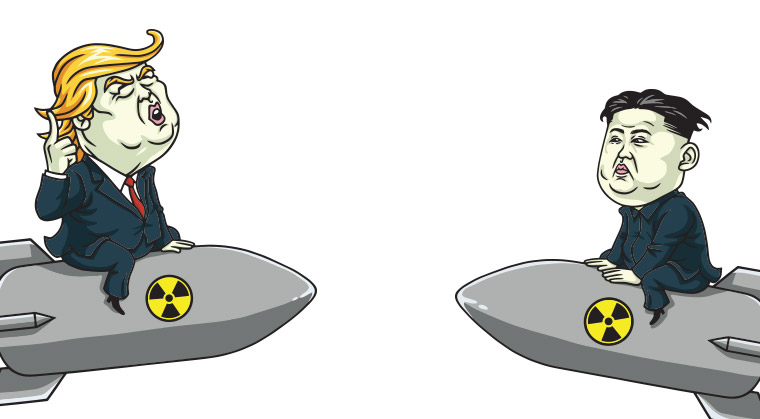When the Donald Met Kim Jong-un

The two don’t exactly like each other, but they are similar in at least two ways: a penchant for unpredictability and a tendency toward dramatics

T
here is a comic element to a potential Donald Trump meeting with North Korea’s leader Kim Jong-un (bombastic president meets bombastic dictator?), but given the consequences of the meeting, it’s not a sit-down to be taken lightly.
For Trump, it’s his chance to prove his skills as the ultimate deal-maker, and to be remembered in the history books as the leader who put the brakes on the North Korean war machine. He’s already drafting his Nobel Prize acceptance speech. As for Kim, this is his golden opportunity to buy time, and possibly cheat the West into easing sanctions.
However you look at it, Trump is taking a huge political gamble. Let’s hope he gets it right, because the consequences of a failed détente could be nuclear war.
Trump and Kim have a long history, going back to April 2013, when Trump, still an ordinary citizen who was playing with the idea of entering politics, tweeted, “Our President must be very careful with the 28-year-old wack job in North Korea. At some point we may have to get very tough — blatant threats.”
A little over a year later, in response to someone who suggested he visit North Korea, Trump tweeted that it was “the last place on earth I’d want to go to.”
By January 2016, when Trump was already on the campaign trail for the Republican primaries, he presented an unconventional approach to traditional Republican foreign policy. Addressing a crowd in Iowa, Trump called Kim “insane,” but also complimented him for succeeding in seizing the reins of power at the young age of 25. “You gotta give him credit… this guy doesn’t play games,” Trump said.
Just a month later, Trump already sounded a lot tougher. In a CBS News broadcast, he said that if he were elected, “I would get China to make that guy disappear in one form or another very quickly.” Without referring to Kim by name, he added, “This guy’s a bad dude, and don’t underestimate him.”
By May 2016, however, Trump had changed his tune. In an interview with Reuters, he said: “I would speak to him; I would have no problem speaking to him.”
Exactly a year later, after he was elected president, Trump called Kim a “pretty smart cookie,” saying that under the right circumstances, he’d agree to meet him.
But then Trump changed his mind again. At the beginning of August 2017, after the United Nations imposed punishing sanctions on North Korea after it tested intercontinental ballistic missiles, Trump stated that if the hermit nation tries to attack the United States, “they will be met with fire and fury.”
This led to an exchange of insults between the North Korean dictator and Trump, with Kim calling him, among other things, “an old lunatic,” and Trump countering with, “Why would Kim Jong-un insult me by calling me ‘old,’ when I would NEVER call him ‘short and fat?’ Oh well, I try so hard to be his friend — and maybe someday that will happen!”
The barbs went from bad to worse, and at the UN General Assembly last September, Trump threatened that if North Korea tries to take on the US, the country will be destroyed completely. North Korea’s foreign minister Ri Yong-ho countered by calling the threats “the sound of a dog barking.” Later that week, Trump gave Kim the moniker “little rocket man.”
So the two don’t exactly like each other, but they are similar in at least two ways: a penchant for unpredictability and a tendency toward dramatics. How else can you explain that a short time after the South Korean delegation brought word to Trump that North Korea would like to meet, the president said yes? What other American president would do that? It’s the very unlikeliness that makes it likely.
(Excerpted from Mishpacha, Issue 702)
Oops! We could not locate your form.













